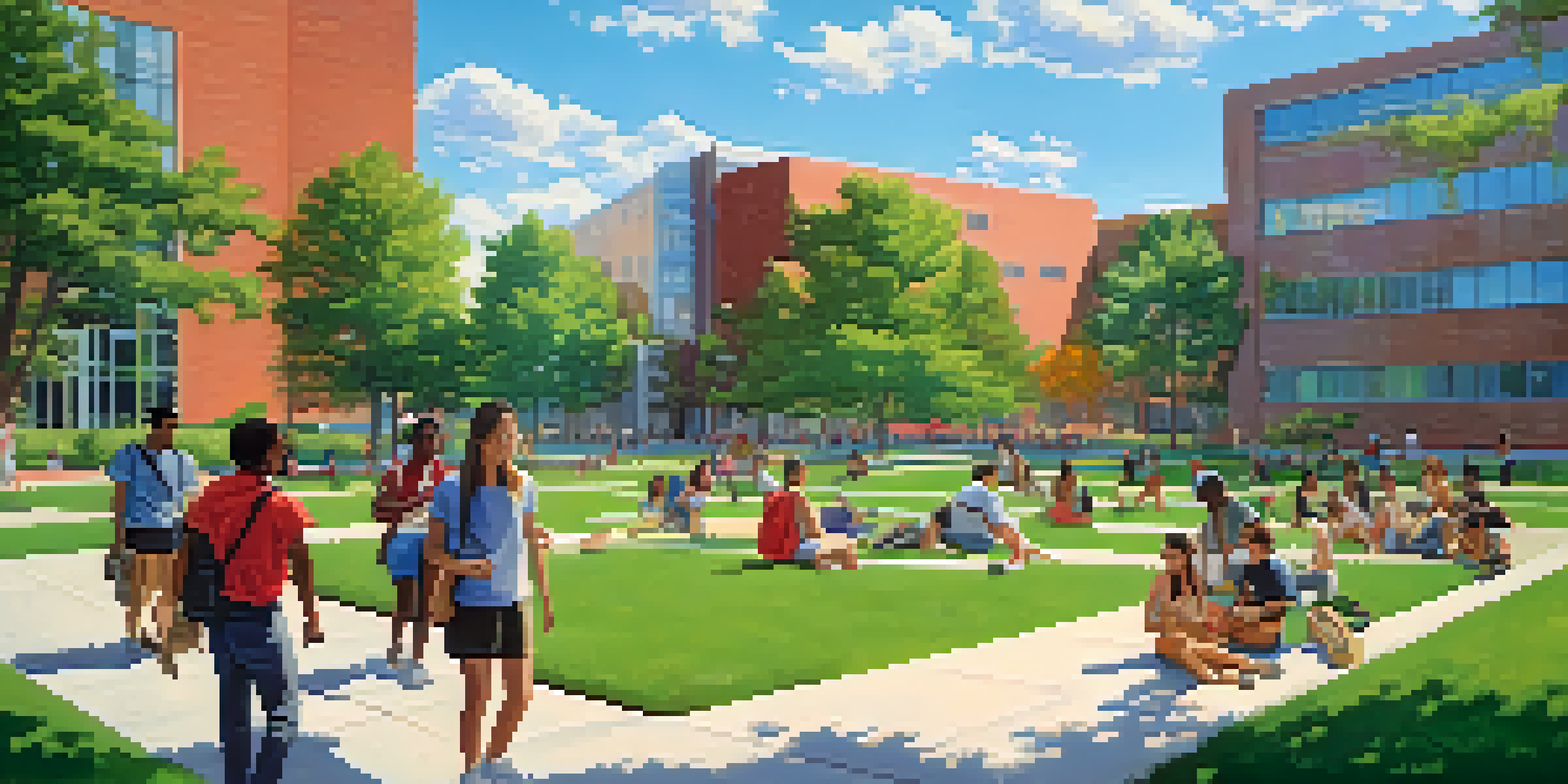Higher Education Institutions in Newark: Key Players and Impact

Overview of Newark's Higher Education Landscape
Newark, New Jersey, is home to a diverse array of higher education institutions that play a vital role in the community. From large universities to specialized colleges, these institutions cater to a wide range of academic interests and career aspirations. They not only educate students but also serve as cultural and economic hubs within the city.
Education is the most powerful weapon which you can use to change the world.
The city’s higher education landscape includes well-known players like Rutgers University-Newark and Essex County College, each contributing uniquely to the region. Rutgers, for example, is renowned for its research programs, while Essex County College provides essential vocational training. Together, they create a rich tapestry of educational opportunities.
These institutions are more than just places of learning; they are integral to Newark's identity and growth. By attracting students from various backgrounds, they foster a vibrant community that benefits local businesses and enhances the city’s cultural fabric.
Key Players: Rutgers University-Newark
Rutgers University-Newark stands out as a key player in the higher education sector. As part of the larger Rutgers system, it offers a wide array of undergraduate and graduate programs, focusing heavily on research and community engagement. The university is a top choice for students seeking a diverse and inclusive environment.

With a commitment to social justice and public service, Rutgers-Newark has made significant strides in addressing community issues. This institution not only educates students but also encourages them to become active citizens, often engaging in local projects and initiatives. Such involvement enriches both the university and the Newark community.
Diverse Institutions Enrich Newark
Newark's higher education landscape includes various institutions that provide a wide range of academic and vocational opportunities.
Moreover, Rutgers' strong partnerships with local organizations and businesses help fuel economic development in Newark. By providing internships, job placements, and collaborative projects, the university plays a crucial role in preparing graduates for the workforce while simultaneously supporting local growth.
Key Players: New Jersey Institute of Technology (NJIT)
The New Jersey Institute of Technology (NJIT) is another cornerstone of higher education in Newark. Known for its emphasis on science, technology, engineering, and mathematics (STEM), NJIT attracts students with a passion for innovation. The university’s cutting-edge research facilities and programs prepare students for careers in high-demand fields.
An investment in knowledge pays the best interest.
NJIT’s role extends beyond academics; it actively contributes to the local economy through technology transfer and entrepreneurship initiatives. The university collaborates with industries to ensure that its curriculum aligns with workforce needs, making its graduates highly sought after in the job market.
Additionally, NJIT fosters a culture of innovation through its startup incubators and business partnerships. This not only helps students launch their careers but also stimulates economic growth in Newark, demonstrating the symbiotic relationship between education and industry.
Key Players: Essex County College
Essex County College plays a vital role in providing accessible higher education to local residents. As a community college, it offers a variety of associate degree programs and vocational training that cater to non-traditional students and those seeking career advancement. Its focus on affordability makes higher education attainable for many in Newark.
The college is dedicated to supporting students from diverse backgrounds, ensuring they have the resources needed to succeed. Through academic advising, tutoring, and financial aid services, Essex County College helps students navigate their educational journeys, which is crucial in a city where many face economic challenges.
Education Drives Economic Growth
Higher education institutions in Newark significantly contribute to the local economy by attracting students and fostering community engagement.
Moreover, Essex County College serves as a bridge to four-year institutions for students aiming to further their education. By fostering partnerships with universities like Rutgers, the college enhances pathways for students to achieve their academic and career goals, thereby strengthening Newark’s educational ecosystem.
The Impact of Higher Education on Local Community
Higher education institutions in Newark significantly impact the local community, driving both economic growth and social change. By attracting students from outside the city, these institutions contribute to the local economy through housing, dining, and retail expenditures. This influx of students creates job opportunities and supports local businesses.
Furthermore, the engagement of students and faculty in community service initiatives fosters a sense of responsibility and connection to Newark. Many institutions encourage their students to participate in volunteer programs, which not only benefits the community but also enriches the students' educational experience.
Through various outreach programs, higher education institutions are also addressing critical social issues like poverty, healthcare, and education inequality. By collaborating with local organizations, they work towards creating sustainable solutions that uplift the community at large.
Challenges Facing Higher Education in Newark
Despite their many contributions, higher education institutions in Newark face several challenges. Funding remains a significant concern, as budget cuts and financial constraints can impact the quality of education and resources available to students. Institutions must continuously seek alternative funding sources to maintain their programs.
Another challenge is ensuring equitable access to education for all community members. Many potential students may face barriers such as financial hardships or lack of information about available programs. Institutions must work to outreach and provide support to underrepresented populations to create a more inclusive educational landscape.
Challenges Demand Innovative Solutions
Despite their contributions, Newark's higher education institutions face challenges like funding and equitable access that require ongoing adaptation and collaboration.
Additionally, institutions must adapt to the rapidly changing job market by updating curricula and incorporating new technologies. Keeping pace with industry demands is essential for preparing students for successful careers, but it requires ongoing collaboration between educators and employers.
Future Trends in Newark's Higher Education Sector
Looking ahead, Newark's higher education institutions are poised to adapt to emerging trends that will shape the future of education. The integration of technology in learning environments, particularly through online and hybrid courses, is becoming increasingly important. This shift can help make education more accessible to a broader audience.
Additionally, there is a growing emphasis on partnerships between institutions and local businesses to create tailored training programs. By aligning educational offerings with workforce needs, institutions can better prepare graduates for the job market, ensuring a strong connection between education and employment.

Moreover, a focus on sustainability and social responsibility is likely to influence the direction of higher education in Newark. Institutions may increasingly prioritize programs that address environmental issues and promote community engagement, reinforcing their commitment to creating positive change.
Conclusion: The Vital Role of Higher Education in Newark
In conclusion, higher education institutions in Newark are vital players in shaping the city’s future. Their contributions extend beyond academics, impacting the economy, community, and local culture. By providing diverse educational opportunities and fostering community engagement, these institutions help create a vibrant and dynamic environment.
As Newark continues to grow and evolve, the role of higher education will only become more significant. Institutions must remain adaptable, addressing challenges while embracing new trends to serve the community better. This commitment to education will ultimately lead to a more prosperous and inclusive Newark.
Ultimately, the synergy between higher education and the local community is what makes Newark a unique place for students to learn and grow. As these institutions continue to thrive, they will undoubtedly leave a lasting imprint on the city and its residents.